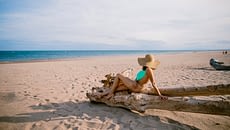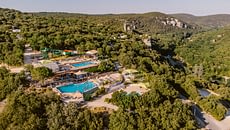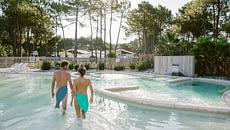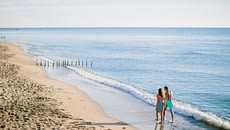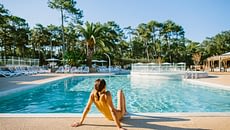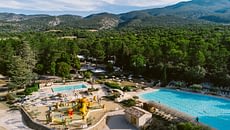
FAQ
(well most of the time!)
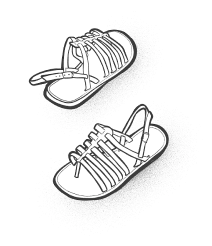
Tempted by the naturist experience, are you still asking yourself a few valid questions? Here is some information which could be useful for you. Don’t forget we recommend sharing and exchanging information, and our teams will be delighted to answer all your questions.
-
What is the difference between naturism and nudism?
Whilst nudism is simply defined as the absence of clothes (for example when swimming), naturism goes beyond this simple concept to become a genuine philosophy. Enthusiasts of naturism favour a healthy and considerate way of life, in harmony with the natural, preserved and indeed respected environment.
-
What are naturism’s values?
Naturism is above all based upon respect: for others, the environment and self-respect. It values individual acceptance, whilst celebrating everyone’s diversity and uniqueness. It also means genuinely going back to your roots, to forgotten feelings, indeed back to basics. Naturism thus enables you to reconnect with yourself and the elements, and to be free from society’s diktats and stress. Lastly, it is wholeheartedly synonymous with conviviality and sharing.
-
What will naturism give me, besides walking around naked?
Practising naturism is not just about living in the nude. Removing your clothes is in fact just one step which enables you to remove the barriers between you and nature, as well as between you and others (when naked, we’re all equal!). Above all, being a naturist, involves exploring a new state of mind, a way of life based on respect, life in harmony with the environment and freedom. That truly gives you a great deal!
-
Do you have to be naked all the time?
Naturally naturists favour nudity and within a dedicated campsite or resort. You’ll see clothes will draw far more attention than the naked body! However, enthusiasts adapt and dress as necessary. Wearing clothes is thus accepted in certain conditions, particularly in the event of adverse weather, illness, or during specific sports activities. The rules may differ between resorts, but actively encouraging nudity is common, indeed required, particularly in lovely weather and within aquatic areas, such as swimming pools and swimming areas.
-
Is naturism also for children and teenagers?
The France 4 Naturisme campsites all recommend healthy family-orientated naturism. We ensure everyone’s behaviour is beyond reproach: your children can have a relaxing holiday.
You should know that young children are very often delighted to be free of their clothes and move around in direct contact with nature, not have to undress and get dressed again all the time. For teens, sometimes upset by their body’s numerous changes, undressing can be more complicated. At France 4 Naturisme, we respect this sense of modesty and agree to them wearing a pareo or towel outside of the swimming areas.
-
Do I need a naturist licence?
In France, obtaining a licence from the Fédération Française du Naturisme (French Naturist Federation) or the International Naturist Federation (INF) was previously required to take part in the activities at a naturist resort, for enjoying access to certain facilities and to inter-resort exchanges, etc. However, since 2001, this licence is no longer demanded by the majority of naturist resorts in France. At France 4 Naturisme, it may be asked for on some establishments, particularly from single people.
-
As a single person, can I go to a naturist resort?
France 4 Naturisme campsites mainly accommodate couples, families and single people accompanying them. Some resorts accept single people on their own, but they are very often asked to produce a naturist licence.
-
Will I feel relaxed despite my body’s imperfections?
The after-effects of an accident, operation scars, amputations: many of us have distinctive body features. Naturism in our renowned resorts is an excellent way to learn to accept them. You’ll see nobody will pay attention to these differences. Each body is unique and deserves respect.
-
What about body piercings?
Body piercings, such as tattoos, are now widespread and very well accepted. However, during your naturist stay, removing any sexual body piercings is preferred. These attract a great deal of attention. Moreover, numerous naturist resorts prohibit them through their internal regulations.
-
What should I do to convince my spouse?
Don’t actually force him or her, but instead have a conversation, explain your approach, listen to their concerns. First try to understand the reason for their barrier to the idea. Maybe propose a “trial weekend”, rather than a three-week stay for the first experience. Reading our blog may also be a good way to approach various topics relating to practicing naturism.
-
What are the origins of naturism in France?
In France, the use of the word “naturism” goes back to 1778. The first mention of it is in a work by Planchon extolling a healthy way of life based on respecting the laws of nature. The practice really caught on in the 1920s, encouraged by doctors who supported it. From the time of the French Popular Front, the naturist movement gained recognition, notably owing to Léo Lagrange. France was also the birthplace of the first naturist campsite in Europe, opened in the Gironde department in 1950. Later, the movement became organized around structures, such as a national federation (the FFN), an international federation (the INF), as well as numerous clubs, associations, and holiday resorts given over to naturism.
